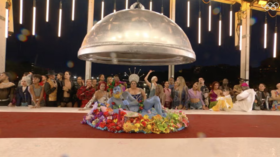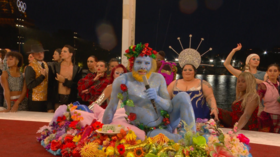Olympic ceremony organizers receive death threats – media

The production company behind the Paris Olympics’ LGBTQ-themed opening ceremony has complained that its employees received death threats warning them of “Allah’s punishment,” Le Parisien reported on Sunday.
The company, Paname 2024, got the threats by email on Friday, the newspaper reported. The messages included a verse from the Quran and stated that “Allah’s punishment will befall the organizers in Saint-Denis,” the paper added, noting that the emails were also sent to the company’s director and to Thomas Jolly, the artistic director of the ceremony.
Paname 2024 has referred the threats to French prosecutors.
The ceremony, which took place in central Paris last month, concluded with a troupe of drag queens, homosexuals, and transsexuals posing at a table, mimicking the appearance of Jesus Christ and his apostles in Leonardo Da Vinci’s ‘The Last Supper’.
A giant serving dish was then wheeled out in front of the table, from which emerged a mostly naked man made up to resemble Dionysus, the Greek god of wine and festivity.
The spectacle provoked outrage among Christians worldwide, with the Bishops’ Conference of France claiming that it “mocked and ridiculed” the faith.
While the ceremony did not explicitly mock Islam, the Muslim world is generally far less tolerant of homosexuality than the Christian world, and Jolly told prosecutors earlier this week that he had also received “threatening messages and insults criticizing his sexual orientation and his wrongly supposed Israeli origins.”
Barbara Butch, the French DJ and pro-obesity activist who played the Christ figure in the ceremony, has been subjected to “violent cyber harassment,” she complained on Instagram last week. Butch’s lawyer, Audrey Msellati, announced that she had filed “several complaints against these acts, whether committed by French nationals or foreigners,” and that Butch “intends to prosecute anyone who tries to intimidate her in the future.”
After the performance, Jolly told French media that the scene was not inspired by ‘The Last Supper’, and was instead intended to evoke a “grand pagan festival connected with the gods of Olympus.” LGBTQ performers were chosen to send a message that “in France, we are allowed to love how we want and who we want,” he added.













